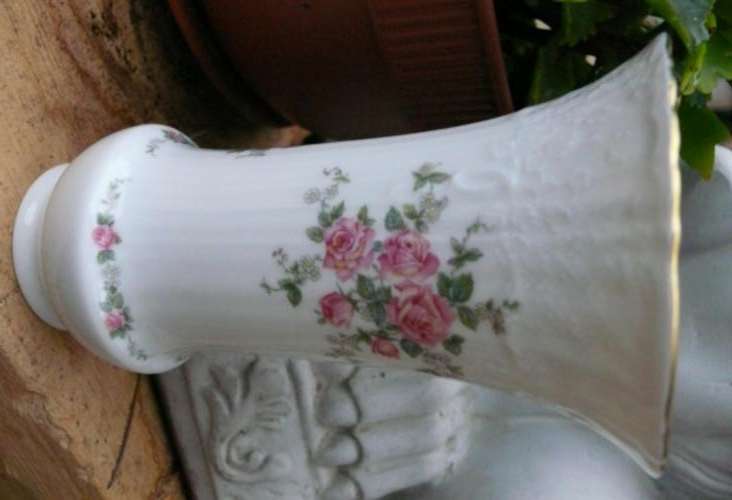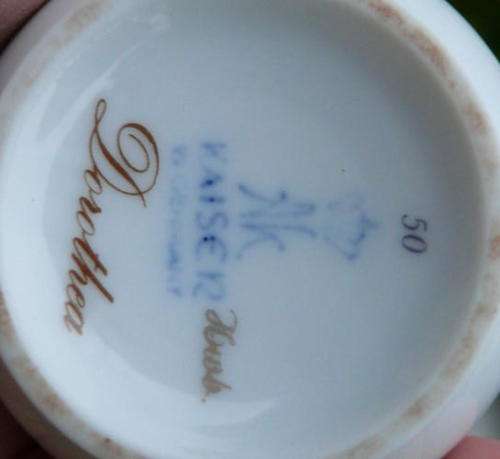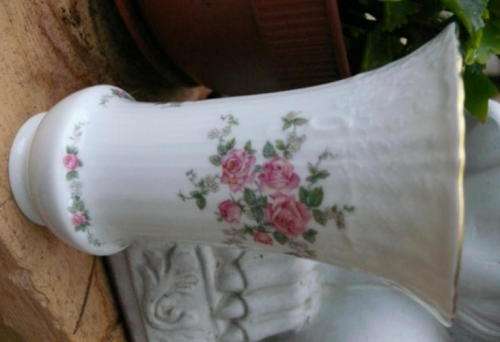
AK KAISER VASE "Dorothea"
Check my rate
| Main centres: | 1-3 business days |
| Regional areas: | 3-4 business days |
| Remote areas: | 3-5 business days |

| Main centres: | 1-3 business days |
| Regional areas: | 3-4 business days |
| Remote areas: | 3-5 business days |
BEAUTIFUL CONDITION, NO CHIPS, NO CRACKS
fully backsatmped and signed
Height: 14cm



5] : Kaiser-Porzellanmanufaktur Staffelstein K.G. (1970 until 2001)
Shortly before 1970, the general direction of the company was re-focussed and a more export-related business was taken in mind. Therefore it was decided to change the company name and alter the trademark to 'Kaiser-Porzellan' because the name 'Kaiser' was more melodious which of course would play an important role in foreign countries. At the end of 1977 Ernst Alboth became manager, leading the company into a new and successful decade together with his father and Hubertus Kaiser.
In 1982, 'Kaiser-Porzellan' could really claim to have become a worldwide trade name - especially among collectors and china-lovers the selected animal sculptures had become extremely desired. The 200th anniversary of the United States of America therefore saw the creation of a model of the U.S. national emblem and national bird - the bald eagle - in a strictly limited edition of 200 pieces, modelled in its natural size by the well-known Italian sculptor, Professor Guiseppe Tagliariol. The first finished piece, #001, was presented to U.S. President Ronald Reagan on October 5th 1982 by Hubertus Kaiser, who also presented #047 to the former British Prime Minister Margaret Thatcher on June 13th 1984.
Based on the ongoing increase of sales, a new factory building with over 7000 square meters was built on the premises during 1985 which was followed by a state-of-the-art fast-firing-oven in 1986. Just as the company reaches its maximum turnover of DM 51 million, Willy Alboth died in 1991. His grandchild Hubertus Alboth steps into the company, but as a young manager he already saw the German porcelain market crumbling. After German reunification, many former East German facilities fell under State funding. These re-privatized companies received substantial financial help through the Treuhandanstalt, giving them a secure background which many struggling West German companies could not hope for as imports from Asia and other Eastern countries started to dominate the market.
But Hubertus Kaiser was still optimistic. In 1997, the company celebrated its 125th anniversary and even if it was proud to still be a completely family-owned business, the annual turnover had decreased to a mere DM 35 million. Various plans were made to save the company, but the battle is nearly hopeless. On December 17th 1998, an exhausted Hubertus Kaiser died, leaving the managers Hubertus and Ernst Alboth with 500 employees working for the company. As part of a social plan, 100 employees were laid off in 1999. The assortment was restructured to a more realistic 50% tableware, 40% gifts and 10% figurines, but still the annual turnover decreased to DM 26 million and so the overall workforce was reduced to 350 people early in the year 2000. Yet the turnover steadily decreased and the general crisis of the ceramic industry further strained the family company.
On October 27th 2000, managing director Hubertus Alboth requested initialisation of the insolvency procedure at the district court of Coburg. Even if it had been known for some time that business was behind expectations, the news came as a shock for the locals. On November 14th 2000, the Bavarian Minister of Economics Mr. Otto Wiesheu could only refer to the meetings which had taken place on October 5th and October 25th, trying to find a solution to at least save a large part of the jobs.
Chances where against the company and the odds were simply sickening. But the grey morning of December 28th 2000 saw the business being taken over by two investors out of the ceramics industry, the 'Pacific Crown Group Ltd.' and Hans-Peter Langsch. At this time a mere 130 workers were still employed and the last turnover obtained was about DM 23 million. But the takeover indicated a vital turning point and the provisional committee of creditors agreed to purchase only a day later, allowing Hans-Peter Langsch to take over management of the thus newly created 'Kaiser-Porzellan Manufaktur Staffelstein G.m.b.H. & Co. K.G.' on January 1st 2001.
